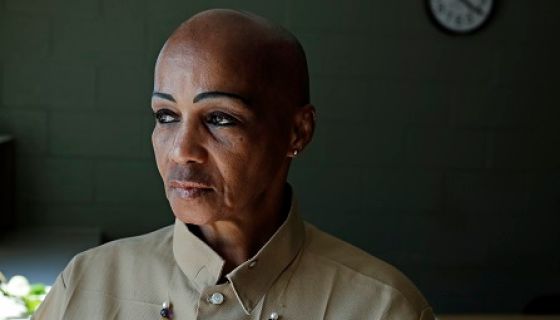‘3 Strikes’ Sentencing Reform Leaves Out Washington Inmates - Page 2
Among them is Devon Laird, age 54 and serving life on a robbery third strike.
Convicted of snatching a wallet from an elderly man outside a drugstore in 2007, Laird’s court records include convictions for violent crimes in his early 20s, but also testimony portraying him as attempting to escape a past that included being stabbed at 14 and shot twice before age 21.
“When they said it wasn’t retroactive, it really set in on me that, man, I got life,” said Laird.
Cheryl Lidel, 60, is also serving life for a 2010 robbery after being convicted of other robberies and theft. She described her crimes as driven by substance abuse that began shortly after she was sexually assaulted as a young girl.
In charging documents for her third-strike robbery, prosecutors said Lidel was going through heroin withdrawal when she robbed a Subway blocks from a police station, sticking her hand in her pocket to imitate a gun. She then asked a taxi to take her to an area known for drug dealing.
“The first time I came here I was 23 years old, and in March of this year I turned 60,” Lidel said.
While it’s hard to say exactly how much time any of the 62 would have faced without their robbery charges counting as strikes, few would have faced life.
With the exception of third-strike crimes, Washington hands out sentences using a formula that takes into account the number and severity of a person’s previous crimes.
According to state guidelines, the maximum for second-degree robbery, given to the highest-level offenders, is less than seven years.
By comparison, a life sentence under the state’s three strikes law is exactly that: Life, without the chance of release.
“I’ve been down 21 years,” Latelliere said.
RELATED: Jailed For Voting, Crystal Mason May Lose Her Home
Some of the 62 might not have received shorter sentences because of other serious crimes on their record, including at least eight with early robbery convictions but a final strike for murder. But nearly half the inmates on the list received a third strike only for some form of robbery.
The bill’s sponsor, Democratic Sen. Jeannie Darneille, said before the state’s legislative session ended that she did not want to change her bill with the amendment killing retroactivity but that it would have been at risk of failing without support from law enforcement or prosecutors because lawmakers would have feared being labeled soft on crime.
Despite its low seriousness classification, second-degree robbery can still be traumatic, said Rep. Brad Klippert, a Republican who is also a police officer and opposed the reform altogether.
LIKE US ON FACEBOOK. FOLLOW US ON TWITTER AND INSTAGRAM
But advocates and the inmates themselves said making the law non-retroactive creates an inescapable disparity: Two prisoners with identical records could end up with vastly different sentences.
It’s not fair “if new people don’t get strikes,” said Lawrence Fillion, an inmate serving life after a third-strike robbery.
“Yet I have the same thing and I am going to die in prison.”
















